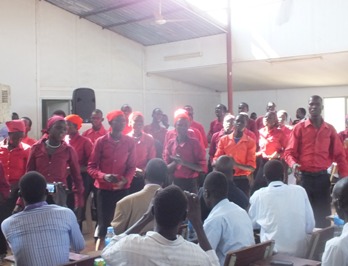Churches launch peace project in Jonglei state
October 15, 2016 (BOR) – South Sudan Council of Churches (SSCC) has launched a peace and reconciliation project in Jonglei state to reduce the tension between the South Sudanese tribes who have been divided by December 2013 conflict.

The project was initiated by South Sudan’s council of churches following a meeting conducted last year in Kigali, Rwanda, where 25 church leaders from South Sudan visited Rwanda, to learn how to create peace among the people, by replicating how Rwanda eradicated genocide from people’s minds and created peace.
Isaac Nyiding, the Peace Regional Facilitator of greater Upper Nile, said during the meeting in Bor on Thursday that most of the peace work will be implemented by the Interchurch Committee in the states.
“Since there are churches spread all over South Sudan it would be very easy for us to implement this. Those churches will be implementing on the ground. Currently we have brought people from Duk, Kongor, Athoch and Malek. We got some people also from Akobo, who are attending with us,” said Nyiding.
The Bishop of Bor Diocese, Ruben Akuurdit, said South Sudan council of churches acts as a neutral body advocating for peace and reconciliation in the country.
“Guns in the hands of people is not solution, we have to disown guns and that why we come for peace building and when we build that peace and we put down guns, what next,” Akurdit wondered.
He suggested the church and the communities should bring up ways through which peace can be sustained in the states, suggesting that agriculture would be the best way to earn living, not through the use of guns.
“Because People use guns for their own survival there are other ways that we can live, we can cultivate we can even have our domestic animal by acquiring your domestic animals without taking somebody’s cattle or goats by force. You can earn your money and they are available in the market,” Akurdit added.
(ST)
